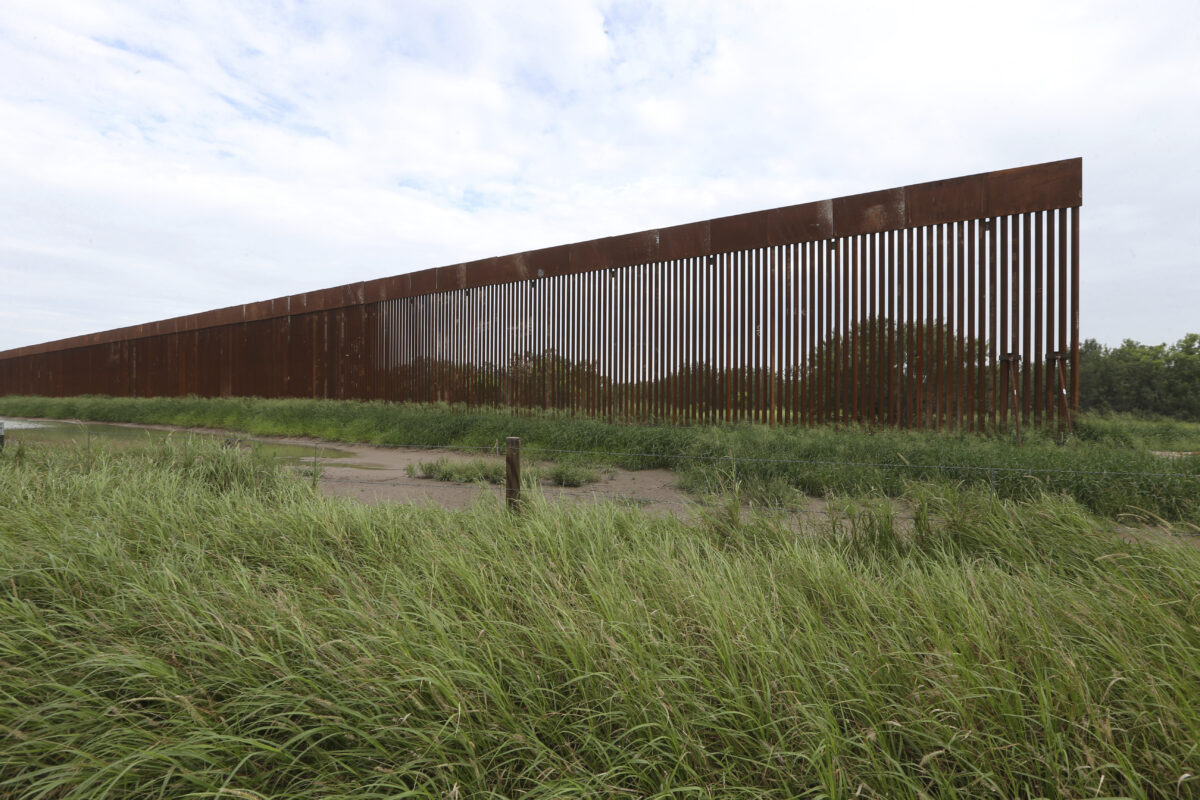Texas Defunds Border Wall Construction After Spending More Than $3 Billion to Build 65 Miles

Delcia Lopez/The Monitor via AP, File
The Texas Legislature cancelled the state’s program to build its own border wall as the legislative session came to a close, having spent more than $3 billion to build only about 65 miles of scattered segments.
In December 2021, Texas Gov. Greg Abbott (R) announced the program at a press conference along the border, the first of its kind in the country, banging a mallet on one of the wall’s metal beams as he “declared the barrier to be impenetrable,” reported The Texas Tribune, but that bold declaration soon ran into challenges:
“It’s heavy and it’s wide,” he said assuredly. “People aren’t making it through those steel bars.”
Three years and $3.1 billion later, Abbott may be right. Migrants and smugglers aren’t breaching the bars. They don’t have to, because they can walk around them.
Today, that completed segment, now 2 miles wide, is an island of metal and concrete surrounded by farmland — hardly an obstacle for migrants who have traveled sometimes thousands of miles to reach the United States.
On Tuesday, the Tribune reported on the end of the wall building program, done with far less fanfare than Abbott’s launch, with legislators having “quietly stopped funding the project,” “without any public debate,” during “the waning hours of this year’s legislative session” with “only scattered segments covering a small fraction of the border” and the future of even those segments “unclear.”
According to the Tribune, “[j]ust 8% of the 805 miles the state identified for construction is complete, which has cost taxpayers more than $3 billion to date.”
Moreover, the segments that were completed have limited impact because they are “full of gaps that migrants and smugglers can easily walk around and mostly concentrated on sprawling ranches in rural areas, where illegal border crossings are less likely to occur.”
The final version of the state budget was approved in early June, and included $3.4 billion for border security, but “none of that money will go toward the wall,” the Tribune reported. State Sen. Joan Huffman (R), who led the work on the budget, confirmed the funds will be directed to implement Abbott’s “Operation Lone Star” migrant apprehensions under the Department of Public Safety and Texas National Guard, and none for further wall construction.
“It’s not that we don’t think it’s an ongoing need to secure the border,” Huffman told the Tribune. “It should have always been a function of the federal government, in my opinion, and that wasn’t really being done.”
It’s unclear how willing President Donald Trump’s administration is to resume wall construction; as the report noted, Trump declared building the wall to be “his top priority” during his first term but only built 21 miles in Texas. His second term seems far more focused on deportations than construction of physical barriers along the border.
Texas’ wall building program was more productive than the feds, but not by much.
In total, the state has finished 65 miles of wall, and will continue work on a few segments currently under construction but no new segments will be started after the project was defunded, according to state officials.
Past investigative reporting by the Tribune found that those 65 miles of wall were “not a contiguous structure, but dozens of fragmented sections scattered across the six counties between Del Rio and Brownsville,” and had hit major roadblocks by the legislature’s prohibition on using eminent domain to seize property and landowners along the border being unwilling to allow the state to build on their land.
Even some of the Republicans in Texas’ GOP majority legislature have publicly questioned the cost effectiveness of the state building its own wall segments:
Before he voted in favor of $1.5 billion for the wall in 2023, Sen. Bob Hall, R-Edgewood, wondered aloud whether the Legislature was “spending a whole lot of money to give the appearance of doing something rather than taking the problem on to actually solve it.”
Discussing the same bill, Republican Sen. Charles Perry of Lubbock likened spending endless money on border infrastructure to being on a hamster wheel.
“At some point this state must draw a line in the sand,” Perry said.
New: The Mediaite One-Sheet "Newsletter of Newsletters"
Your daily summary and analysis of what the many, many media newsletters are saying and reporting. Subscribe now!






Comments
↓ Scroll down for comments ↓